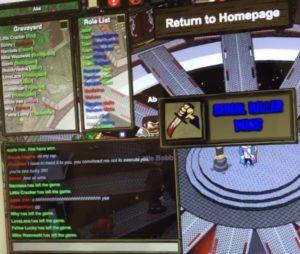
I chose to play Town of Salem, a multiplayer online game created by Blank Media Games. From what I could discern from the message board and in game messaging, it seems to be a game geared towards teenagers and young adults.
There are 15 players in each game, divided into three groups. There are the townspeople (9), the mafia (4), and the neutral characters (2). During the daytime, there is a discussion period, where the players can share information they may have about other players, and then a voting period where the town can put someone on trial and then vote to execute them. The goal of each of the groups is to eliminate all of the members of the opposing groups. At night, each character has a role they can perform, which are described in more detail below. Broadly, the mafia and neutral killing character have the ability to attack a player of their choice each night, while townspeople can take actions to gather information and protect others.
Within each group there are a number of roles. For townspeople there are investigative roles that attempt to discern the role of other players, protective roles that can protect players from being killed at night, support roles that c, and killing roles that have the ability to kill other players at night. The mafia has a similar structure, there are killing members of the mafia and support/investigative members. For the neutral characters, there is one killing character, in my game I was the serial killer, that as the name suggests can kill others at night, and an evil character that has its own objectives in the game, normally attempting to trick the town into hanging one of their own members.
The game generates a variety of different kinds of fun. Given that players take on roles, it generates fantasy fun, and as the game creates a story it also generates narrative fun as well. Additionally, given there is a large amount of conversation that takes place in the games I feel the game also generated fellowship fun for me as well.
The game works because there is an appropriate balance between the overall strength of each of the groups that gives them all if not a perfectly equal chance of victory, at least a fair one that makes the game engaging. One area the game could be improved is ensuring that each role performs a task that is interesting to players in order to minimize the number of players that have roles that aren’t terribly relevant, which could lead to disengagement.
Town of Salem is similar to Mafia, as the presence of a mafia would suggest, but it is different in a few notable ways. The main differences I’d like to point out is the presence of neutral characters and the wide variety of roles when compared to the limited number of roles in mafia and the presence of only two teams. I think this makes Town of Salem a better game because it increases and deepens the level of thinking present in the game, and makes each game more unique and interesting.
Finally, Town of Salem doesn’t require a large degree of vulnerability from players. Given each player takes on a make believe role, it is somewhat disconnected from reality and therefore insulates players from being vulnerable.


